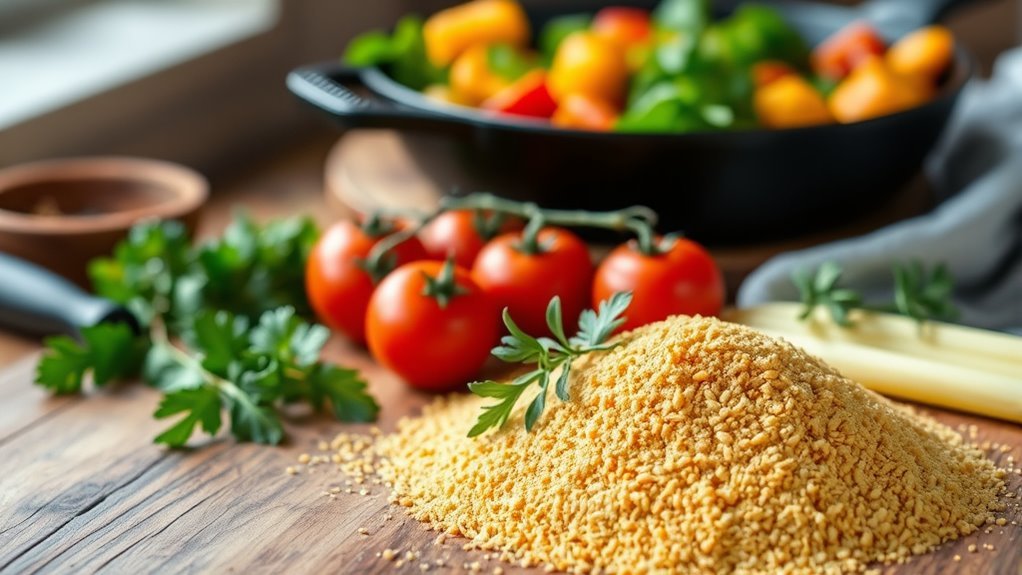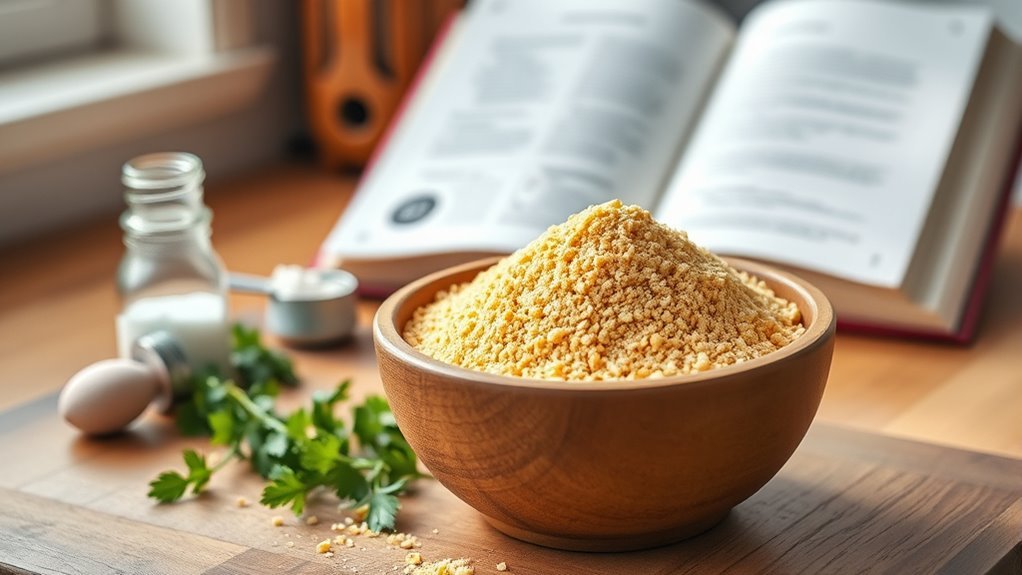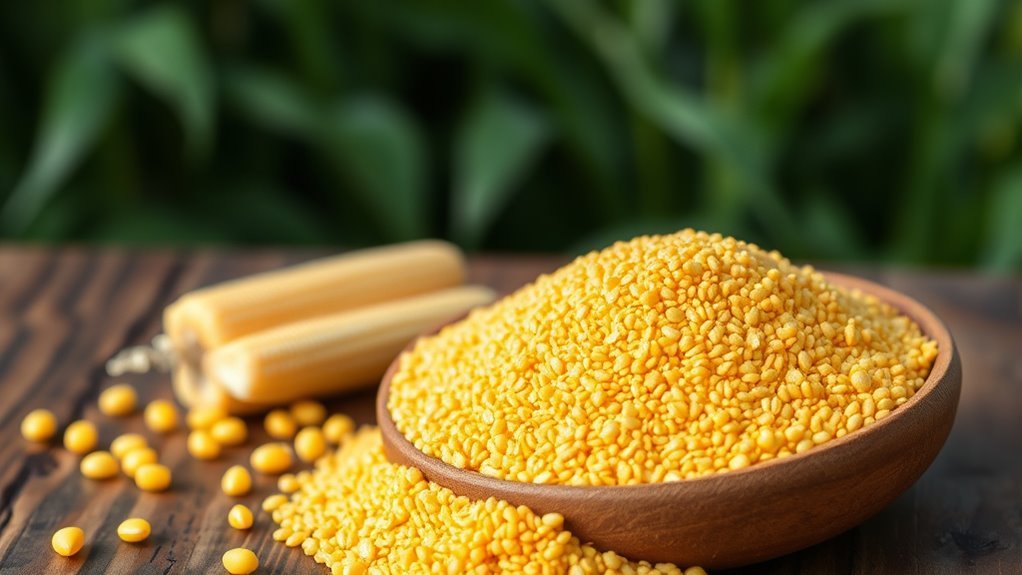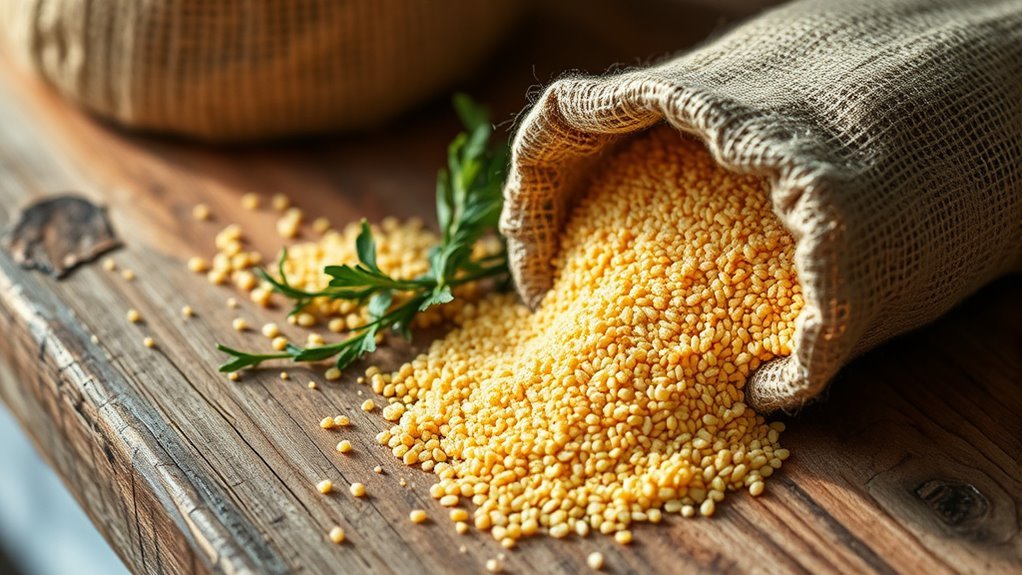Cornmeal isn’t keto-friendly due to its high carbohydrate content. One cup contains about 90 grams of carbs, considerably exceeding the typical daily limit for a ketogenic diet. This can disrupt ketosis, making it challenging to maintain. While it does offer nutritional benefits, like fiber and essential minerals, moderation is key if you choose to enjoy it. There are lower-carb alternatives available that fit better within a keto lifestyle, which you might find interesting.
Understanding Cornmeal and Its Nutritional Profile

Cornmeal, a staple ingredient in many cuisines, is derived from ground corn and is often used in dishes like cornbread and polenta. You’ll find various cornmeal varieties, such as fine, medium, and coarse, each suited for different cooking techniques. For instance, fine cornmeal works well for smooth polenta, while coarse cornmeal gives a hearty texture to cornbread. When cooking, you might consider how these textures affect your dishes. Additionally, cornmeal can be used as a coating for fried foods or as a thickening agent in soups. Understanding these aspects can enhance your culinary freedom, allowing you to experiment with flavors and textures while creating satisfying meals that cater to diverse palates.
Carb Content of Cornmeal

When considering the carb content of cornmeal, it’s important to recognize that it contains a significant amount of carbohydrates, which can impact those following a ketogenic diet. Typically, one cup of cornmeal has around 90 grams of carbs, making it challenging to fit into a strict keto regimen. Different cornmeal varieties, like yellow and white, have similar carb counts, so the choice won’t offer much relief for those counting carbs. However, if you’re looking for keto substitutes, options like almond flour or coconut flour can provide lower-carb alternatives for your recipes. Additionally, understanding the carbohydrate content of various foods is essential for maintaining a ketogenic lifestyle. Ultimately, it’s essential to be mindful of your carb intake and explore these substitutes if you want to maintain a ketogenic lifestyle while enjoying your favorite dishes.
The Role of Carbohydrates in a Ketogenic Diet

In a ketogenic diet, understanding carbohydrate limits is essential for achieving and maintaining ketosis. Not all carbohydrates are created equal; the types you consume can considerably impact your body’s ability to enter this fat-burning state. By focusing on low-carb options and being mindful of your total intake, you can better navigate your dietary choices. Limiting carbs shifts the body from burning glucose to fat, leading to improved mental clarity and energy levels.
Understanding Carbohydrate Limits
As you explore the ketogenic diet, understanding carbohydrate limits is essential for achieving and maintaining ketosis. Generally, you’ll want to keep your daily carb intake between 20 to 50 grams, depending on your individual needs. This requires careful meal planning and carb tracking to guarantee you stay within your limits. Focus on low-carb vegetables and healthy fats while avoiding high-carb foods like grains and sugars. It’s helpful to read nutrition labels and use apps to monitor your intake. By being mindful of your carb consumption, you can enjoy the freedom of eating delicious, satisfying meals while still adhering to the principles of the ketogenic lifestyle. Remember, balance is key, so find what works best for you. Additionally, regular adjustments based on individual reactions to carbs can help optimize your keto journey.
Types of Carbohydrates
Although carbohydrates are often viewed as the enemy in a ketogenic diet, understanding their types is essential for making informed food choices. Carbohydrates can be categorized into simple and complex carbohydrates. Simple carbohydrates, like sugar and refined grains, are quickly absorbed by your body, leading to spikes in blood sugar levels. In contrast, complex carbohydrates, found in whole grains and vegetables, digest more slowly, providing a gradual release of energy. While many keto dieters limit all carbs, knowing the difference can help you make better choices. Opting for complex carbohydrates when you do consume them allows for a more balanced approach, promoting freedom in your diet while still working towards your health goals. Understanding these types helps you navigate your options effectively, especially when considering the recommended daily carbohydrate intake for maintaining ketosis.
Impact on Ketosis
While many people embrace a ketogenic diet for its weight loss benefits, understanding the role of carbohydrates is essential for maintaining ketosis. Carbs can disrupt the metabolic state you aim for, so knowing which options fit your lifestyle is vital. Here are a few points to reflect on:
- Keto friendly grains are scarce; most traditional grains are high in carbs.
- Low carb substitutes like almond flour or coconut flour can help satisfy cravings without kicking you out of ketosis.
- Monitoring your carb intake is vital; typically, you want to stay under 20-50 grams per day.
- Incorporating non-starchy vegetables can provide needed nutrients while keeping carbs low. Additionally, maintaining a balance between carb intake and healthy fats is crucial for successful weight loss on a ketogenic diet.
How Cornmeal Affects Ketosis
When considering how cornmeal affects ketosis, it’s important to analyze its carbohydrate content and glycemic index. High carb levels can hinder your ability to maintain ketosis, so understanding these factors is essential. Luckily, there are alternative options that may better fit your keto lifestyle.
Carb Content Analysis
Cornmeal, a staple in many kitchens, is often scrutinized in the context of a ketogenic diet due to its carbohydrate content. With various cornmeal varieties available, it’s essential to understand how they can impact your keto journey. Most cornmeal contains about 30 grams of carbs per 100 grams, which can greatly hinder your ability to maintain ketosis.
Here are some key points to reflect on:
- Cornmeal is high in carbs, making it less ideal for keto.
- Alternative keto substitutes like almond flour or coconut flour can be better options.
- Portion control is important if you choose to include cornmeal occasionally.
- Explore low-carb recipes to satisfy cravings without derailing your diet.
- Additionally, processed corn products may offer some options that are more compatible with a low-carb lifestyle.
Understanding these factors can help you make informed choices.
Glycemic Index Impact
Understanding the glycemic index (GI) of foods can be vital in maintaining ketosis, especially since high-GI options can spike blood sugar levels. Cornmeal typically has a moderate GI, which means it can elicit a significant glycemic response that may disrupt your state of ketosis. If you’re aiming to stay low-carb, it’s wise to take into account cornmeal substitutes like almond flour or coconut flour, which have lower GI values and won’t compromise your blood sugar control as much. By choosing these alternatives, you can enjoy similar textures and flavors while keeping your carb intake in check. Ultimately, being aware of the glycemic impact of cornmeal is essential for anyone committed to a ketogenic lifestyle, as high carbohydrate content can hinder progress in achieving your dietary goals.
Alternative Options Available
For those on a ketogenic diet, finding suitable alternatives to cornmeal is essential, as its carbohydrate content can hinder your ability to maintain ketosis. There are several cornmeal substitutes that can enhance your keto baking without sacrificing flavor or texture.
Consider these options:
- Almond flour: Low in carbs and high in healthy fats, it’s perfect for baked goods.
- Coconut flour: Absorbs moisture well and offers a subtle sweetness.
- Flaxseed meal: Rich in omega-3 fatty acids and excellent for adding fiber.
- Psyllium husk: Adds texture and helps bind ingredients in various recipes.
Using these alternatives allows you to enjoy your favorite dishes while staying committed to your ketogenic lifestyle. Tracking carbohydrate intake is crucial to ensure you remain in ketosis while enjoying your keto baking! Embrace the freedom of keto baking!
Alternatives to Cornmeal for Keto Dieters
When following a keto diet, finding suitable alternatives to cornmeal can be essential for maintaining your carb limits while still enjoying a variety of dishes. Here are some effective keto substitutes:
| Keto Substitute | Type | Usage |
|---|---|---|
| Almond Flour | Low Carb Flour | Baking, thickening |
| Coconut Flour | Low Carb Flour | Baking, pancakes |
| Flaxseed Meal | Nut Based Meal | Breading, smoothies |
| Psyllium Husk | Low Carb Fiber | Binding, texture |
You might also consider cauliflower rice, zucchini noodles, or vegetable purees for added versatility in your meals. These alternatives allow you to enjoy your favorite recipes while staying within your keto goals, offering freedom and creativity in your kitchen! Incorporating low-carb vegetables into your meals can enhance nutrition and keep you satisfied throughout the day.
Creative Ways to Use Cornmeal in Your Meals
Although cornmeal is often considered off-limits for those on a strict keto diet due to its higher carbohydrate content, there are still creative ways to incorporate it into your meals without derailing your dietary goals. By focusing on moderation and balance, you can enjoy cornmeal in various forms. Here are some ideas:
- Cornmeal crust for savory tarts: Use a small amount to create a tasty base for low-carb toppings.
- Polenta-style side dish: Pair it with healthy fats and veggies for a filling option.
- Cornmeal-fried cheese: Coat cheese in cornmeal for a crunchy, satisfying snack.
- Creative toppings: Try seasoned cornmeal on salads or soups for added texture.
These cornmeal recipes let you explore new flavors while staying mindful of your carb intake.
Portion Control and Serving Sizes
Incorporating cornmeal into your meals can certainly add flavor, but understanding portion control and serving sizes is key to keeping your keto diet on track. Cornmeal is higher in carbohydrates compared to other keto-friendly alternatives. Therefore, it’s essential to be mindful of how much you use. A typical serving size is about 1-2 tablespoons, which can help you enjoy its taste without exceeding your daily carb limit. By practicing portion control, you can still indulge in your favorite recipes while maintaining the freedom to enjoy various foods. Pay attention to how cornmeal fits into your overall macros, adjusting serving sizes as needed. This balance allows you to savor the benefits of cornmeal while staying true to your keto goals.
Nutritional Benefits of Cornmeal
While cornmeal may not be the top choice for those strictly adhering to a keto diet, it does offer several nutritional benefits that can be worth considering. If you’re looking for cornmeal alternatives, it’s good to know what this ingredient brings to the table:
- Rich in Fiber: Supports digestive health and helps maintain bowel regularity.
- Gluten-Free: A great option for those with gluten sensitivities or celiac disease.
- Vitamins and Minerals: Provides essential nutrients like iron, magnesium, and B vitamins.
- Energy Source: Offers carbohydrates that can fuel your day, especially if you’re active.
Popular Dishes Using Cornmeal
When it comes to popular dishes using cornmeal, you’ll find that this versatile ingredient can be transformed into a variety of delicious meals and snacks. From classic cornbread and polenta to cornmeal pancakes, these cornmeal dishes showcase regional variations that reflect local flavors. In the Southern United States, you might enjoy savory cornbread served alongside chili, while in Italy, polenta often takes center stage, served with rich sauces. In Mexico, masa harina, a type of cornmeal, is used for tamales and tortillas. These dishes highlight cornmeal’s adaptability, making it a staple in many cuisines. Whether you’re craving something sweet or savory, cornmeal offers a canvas for culinary creativity, allowing you to explore diverse tastes from around the world.
Making Informed Choices for Your Keto Lifestyle
When you’re following a keto lifestyle, understanding the nutritional profile of ingredients is essential. Analyzing alternatives to cornmeal can help you maintain your carb limits while still enjoying your favorite dishes. Exploring options like almond flour or coconut flour can lead to satisfying meals that fit your dietary goals. Additionally, considering low-carb alternatives can provide a variety of textures and flavors without exceeding your carbohydrate limits.
Nutritional Profile Analysis
Understanding the nutritional profile of cornmeal is essential for anyone steering through a keto lifestyle. While cornmeal has its place in many diets, it’s important to know how it fits into your low-carb goals.
- Caloric Density: Cornmeal is fairly high in calories, which can impact your weight management.
- Carbohydrate Content: A serving can contain significant carbs, making it a less ideal choice.
- Fiber Content: It does offer some fiber, but it’s not enough to offset the carbs for a keto diet.
- Nutrient Profile: Cornmeal provides vitamins and minerals, but you need to weigh these against its carb content.
Alternative Ingredients Exploration
What alternatives can you consider if cornmeal doesn’t fit your keto lifestyle? There are plenty of cornmeal substitutes that can elevate your keto baking without compromising your dietary goals.
Here’s a quick comparison of some popular options:
| Substitute | Net Carbs (per 1/4 cup) |
|---|---|
| Almond Flour | 3g |
| Coconut Flour | 6g |
| Chia Seed Meal | 2g |
| Flaxseed Meal | 0g |
These alternatives not only keep your carb count low but also provide healthy fats and fiber. Experimenting with these substitutes can enhance your recipes and keep your meals satisfying while adhering to a keto lifestyle. Enjoy the freedom to create delicious dishes!
Frequently Asked Questions
Can I Use Cornmeal in Keto Baking Recipes?
You can’t really use cornmeal in keto baking, as it’s high in carbs. Instead, consider cornmeal alternatives like almond flour, coconut flour, or flaxseed meal. These options provide a similar texture while keeping your carb intake low. Balancing your desire for tasty baked goods with keto guidelines doesn’t have to be limiting. Embrace these substitutes for delicious treats that still fit your lifestyle and let you enjoy your freedom in the kitchen!
What Are the Best Cornmeal Substitutes for Keto?
For keto baking, you might want to contemplate low carb alternatives like almond flour, coconut flour, or ground flaxseed. Almond flour’s nutty flavor works great in various recipes, while coconut flour absorbs moisture well, so you’ll need to adjust liquid ingredients. Ground flaxseed can add a unique texture and is high in fiber. These substitutes not only keep your carb count low but also allow you to enjoy delicious baked goods without sacrificing your keto lifestyle.
How Does Cornmeal Compare to Almond Flour?
Cornmeal and almond flour differ considerably in nutritional differences and baking properties. Almond flour’s higher fat content makes it lower in carbs and richer in protein, ideal for keto diets. In contrast, cornmeal contains more carbohydrates and less protein, which isn’t as keto-friendly. When baking, almond flour provides a moist texture and binds well, while cornmeal can create a coarser crumb. Knowing these differences helps you make informed choices for your recipes.
Is Cornmeal Gluten-Free?
Yes, cornmeal is generally gluten-free, making it a suitable option for those with gluten sensitivities. It’s packed with health benefits, including being rich in fiber and essential nutrients. If you’re looking for cornmeal alternatives, consider almond flour or coconut flour, both of which also provide unique nutritional profiles. By incorporating these options, you can enjoy a variety of textures and flavors in your meals while maintaining a gluten-free diet.
Can Cornmeal Be Part of a Low-Carb Diet?
You can’t have your cake and eat it too, but cornmeal can fit into a low-carb diet with caution. While it offers some nutritional value, including fiber and vitamins, it’s relatively high in carbs compared to low-carb alternatives like almond flour or coconut flour. If you choose to include cornmeal, be mindful of portion sizes to stay within your carb limits while enjoying a bit of variety in your meals.
1. Is cornmeal keto-friendly?
Cornmeal is generally not considered keto-friendly due to its high carbohydrate content. A typical serving of cornmeal contains about 73 grams of carbs per 100 grams, which can easily exceed the daily carb limit for those on a ketogenic diet. For comparison, a strict ketogenic diet typically limits carbohydrate intake to about 20-50 grams per day. Therefore, it’s best to avoid cornmeal if you’re trying to maintain ketosis.
2. Are there keto-friendly alternatives to cornmeal?
Yes, there are several keto-friendly alternatives to cornmeal. Almond flour and coconut flour are popular substitutes that are lower in carbohydrates and higher in healthy fats. Additionally, ground flaxseed and chia seeds can be used to create a similar texture in baking or cooking. These alternatives can help you achieve desired results without compromising your ketogenic diet.
3. Can I use cornmeal in moderation on a keto diet?
While it’s technically possible to use cornmeal in moderation, doing so may make it challenging to stay within your carb limit on a keto diet. If you choose to include it, be sure to carefully track your total carbohydrate intake for the day and consider the impact it may have on your ketosis. For most people, it’s advisable to limit cornmeal consumption to avoid disrupting their ketogenic goals.
4. What are the nutritional benefits of cornmeal?
Cornmeal does offer some nutritional benefits, including being a good source of fiber, vitamins, and minerals such as magnesium and iron. It also contains antioxidants that can contribute to overall health. However, these benefits must be weighed against its high carbohydrate content, especially for those following a ketogenic diet, making it less favorable compared to low-carb options.
5. How can I make my meals more keto-friendly without cornmeal?
To make your meals more keto-friendly without cornmeal, consider using low-carb vegetables like zucchini, cauliflower, or broccoli as substitutes in recipes. Also, explore using healthy fats such as olive oil, avocado oil, or butter to enhance flavor and satiation. Additionally, incorporating protein sources like meat, fish, and eggs can help create filling meals that align with a ketogenic lifestyle.
References
- https://www.healthline.com/nutrition/keto-friendly-foods
- https://www.ncbi.nlm.nih.gov/pmc/articles/PMC5413139/
- https://www.diabetesselfmanagement.com/healthy-living/food-and-nutrition/what-is-keto/
- https://www.webmd.com/diet/what-is-the-keto-diet
- https://www.medicalnewstoday.com/articles/323348
- https://www.wheathealth.org/health/health-benefits-of-cornmeal
- https://www.corn.org/cornmeal-and-corn-flour-what-is-the-difference/


